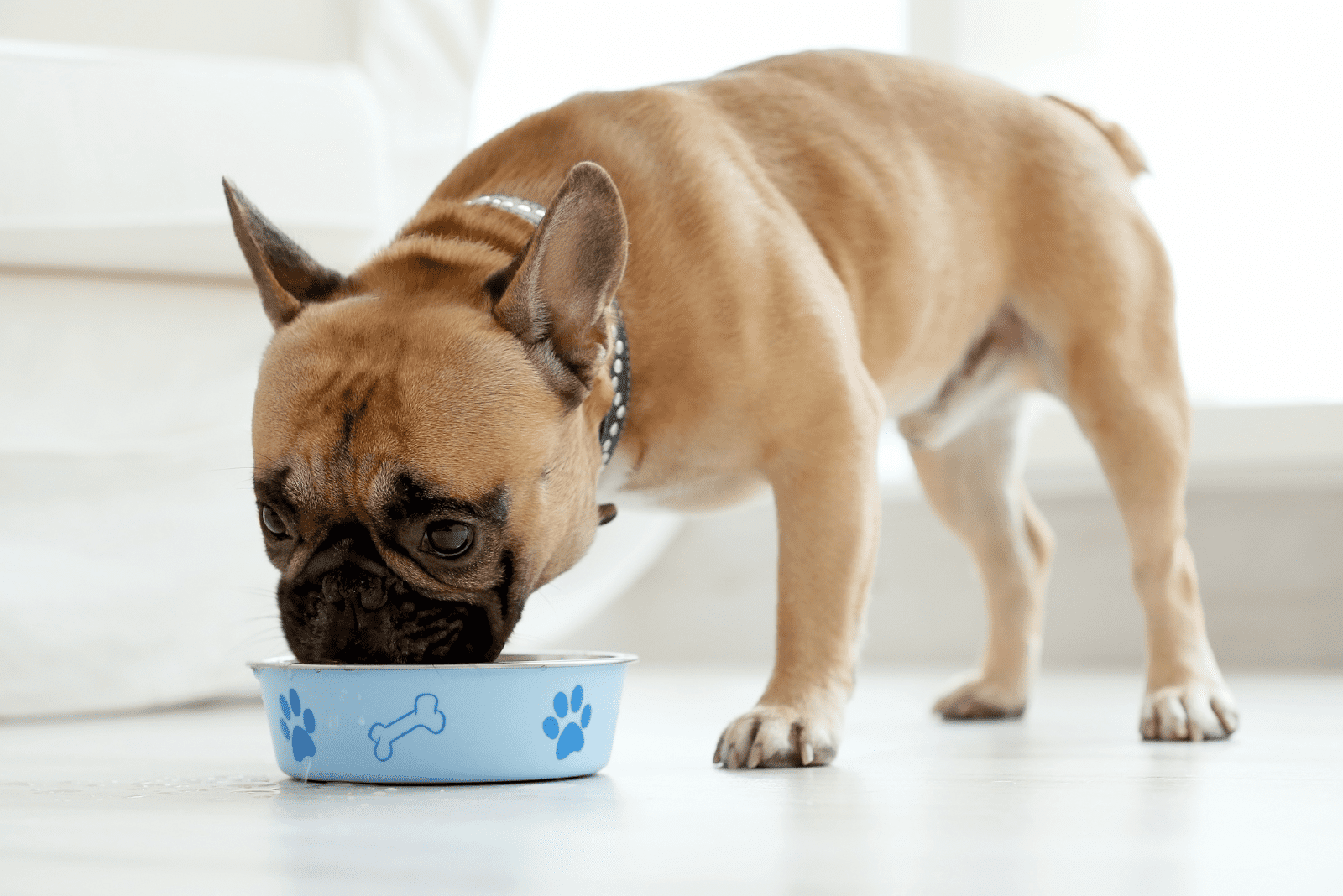The French Bulldog feeding chart is the best way to find out all about healthy eating habits that should be acquired by every family who owns a Frenchie.
French Bulldogs are prone to weight gain, which is why their diet should be supervised from the first day they start eating solid food.
Find out how to feed your Frenchie pup from the first day you get it from a breeder (or as soon as you wean it off of mother’s milk if you produce Frenchie newborns).
RELATED: Top 6 French Bulldog Breeders In California: Our Choices + More!
French Bulldog Feeding Chart By Age
[table id=514 /]
French Bulldog Puppy Feeding Chart (2 to 6 months)
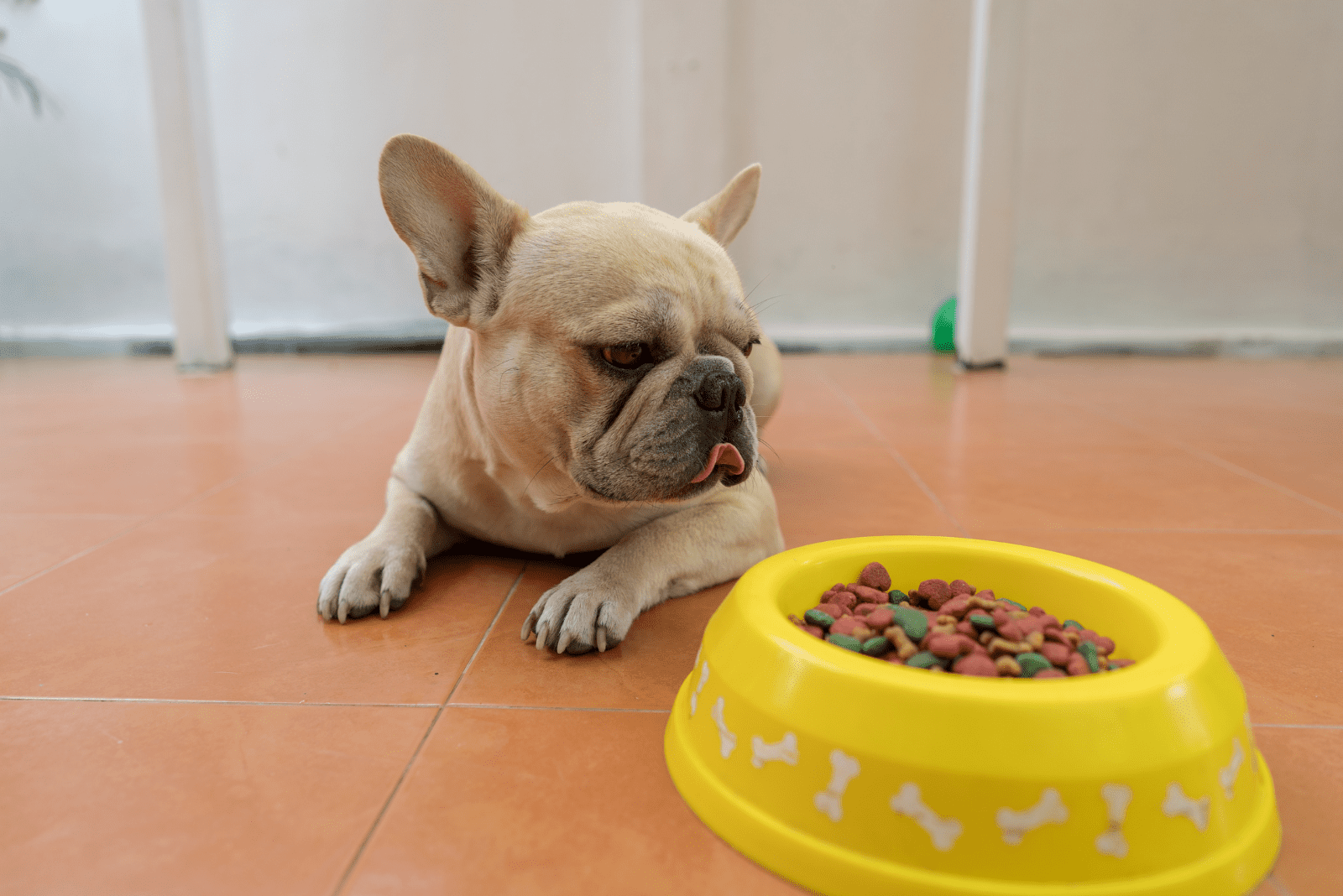
One of the best puppy foods is the natural one that comes from their mother. However, it’s not always easy to nurse puppies, especially since they start growing teeth at quite an early age.
Nursing usually lasts only through the first few weeks of a puppy’s life until their teeth come out, which is around the third and fourth week of the dog’s age.
The soreness that comes with feeding teething pups causes the dog’s parent to stop breastfeeding the puppies before they have had enough food to satisfy their needs.
This is exactly why it’s important to introduce your puppies to other sources of nourishment at an early age. Of course, if the female Frenchie doesn’t stop nursing her pups during this period, you can try to encourage her to continue doing so for as long as she is comfortable with it.
However, once you realize that your adult Frenchie is rejecting nursing her pups, it’s time for weaning.
How Do You Wean Puppies And Accustom Them To Solid Food?
To start the process of weaning, you will need to take the female Frenchie away from the pups for a certain amount of time.
It’s recommended to do so for at least one hour, two to three times a day, so that the puppies may become used to eating solid meals.
Young Frenchies require high-quality puppy food that contains all of the necessary nutrients as well as a greater caloric content and good fats to assist in their growth into healthy canines.
You should incorporate solid sources of animal protein into the diet of your French Bulldog puppy. Some examples of such foods are chicken, beef, and fish.
Proteins are essential for the healthy development of French Bulldogs, especially their muscles, as well as in keeping them far from obesity, which they’re prone to.
It is important to keep in mind, however, that eating an excessive amount of protein can lead to a rise in urea, which, in turn, can cause harm to the kidneys.
On the opposite side, fats are a great source of energy that can be measured in terms of their calorie content. A rich source of omega-fatty acids are essential for the growth of your Frenchie’s fur as well as for the maintenance of healthy brain function.
French Bulldog Puppy Feeding Chart (6 to 12 months)
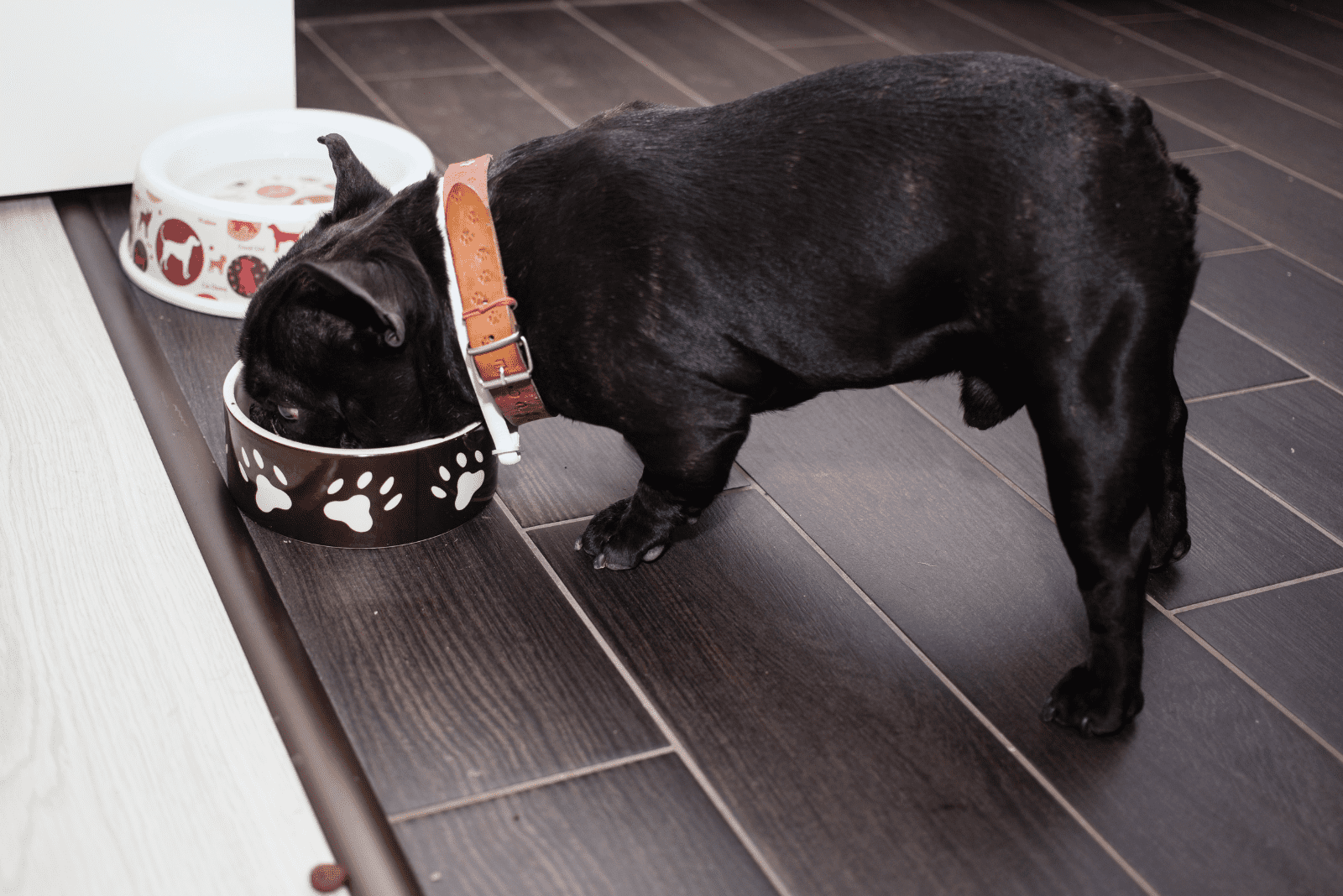
Once your pup gets used to solid foods, it’s time to start creating routines based on the table that is shown above.
High-quality food usually contains all the nutrients for the healthy development of your Frenchie pup, including the immune system.
However, if you notice that your pup isn’t getting enough body weight or that it doesn’t respond well to the food, you should take it to the vet to check whether it needs to take additional supplements or switch to other types of food.
You should stick to the same eating routine every day without changing the portions your pup can have. This way, the Frenchie pup will gain healthy weight and will be prone to fewer health problems, including gastric dilatation-volvulus, which is usually caused by big portions of food.
Adult French Bulldog Feeding Chart (2 to 6 years)
Frenchies are known to have low activity levels, which is one of the main reasons why they’re considered a lazy canine breed.
That is why it’s of great importance to keep the Frenchie’s body mass at reasonable levels and prevent obesity, which is another big health issue of French Bulldogs.
Obesity is a serious health problem that can be the root cause of a variety of other, sometimes even life-threatening health issues.
When Do Frenchies Become Full-Grown Adults?
When it comes to their maturity and size according to the years, Frenchies should become full adult canines between the ages of one and two.
Essentially, this means that most French Bulldogs reach their maximum height at up to a year and a half at the most. This is important for the feeding chart as height represents one of the essential guides for healthy body weight gain.
In order to grow in a healthy manner, younger puppies need to consume a suitable quantity of carbohydrates, protein derived from animals, and good fats as part of their diet.
Please be aware that as owners of French Bulldogs, it is important for you to keep in mind that an oversupply of protein and calories could lead to serious consequences.
That is why you should exercise extreme caution whenever you are providing them with food.
In fact, the pet’s nutritional needs, in conjunction with the puppy’s level of physical activity, are essential factors that simply have to be taken into consideration if you want your dog to be a healthy part of your family for many years to come.
Older Adult French Bulldog Feeding Chart (7 years and more)
Because they have lower energy levels as they become older, French Bulldogs have a lower caloric need in their food than younger adult pups do.
Most people are used to the increase in the number of cups of food as the canine becomes bigger and older.
However, there’s a certain point in a canine’s life when their energy drops significantly, and that is usually after the seventh year of life, at least for most canines, except for long-living Chihuahuas and other dog breeds that live for more than 16 years.
At that point, it’s highly recommended to decrease the amount of food they receive, along with the percentages of fat, carbohydrates, proteins, and other ingredients of the food.
What If You Overfeed Your Adult Dog?
If you overfeed a senior Frenchie, it may have a damaging effect on their brittle joints and bones because they don’t demand as much nutrition as younger canines.
In addition, if you want to keep your canine’s digestive system healthy, you should feed your old French Bulldog with kibble that is low in fat.
Senior French Bulldogs often have digestive issues, which makes it all the more important to select the best possible dog food for them.
Because of their short, sturdy, muscular body and their tiny muzzle, Frenchies are predisposed to a wide array of ailments that are typical for small dog breeds.
During the later years of its life, if you provide your French Bulldog the best nourishment you possibly can, it will be less likely to be affected by the diseases listed here.
Is There Any Difference Between Genders?
There is a possibility that male and female Frenchies have different calorie needs due to the differences in their body structure and size.
This is also true with French Bulldog crossbreeds that result in a dog with a shorter length, such as the miniature French Bulldog.
Always get advice from your trusted vet, especially if you want to prepare homemade meals for your senior French Bulldog. If that is the case, you are going to have to put in additional work as a dog owner to determine the number of calories that your dog consumes on a daily basis.
How Often Do You Need To Feed Your French Bulldog?
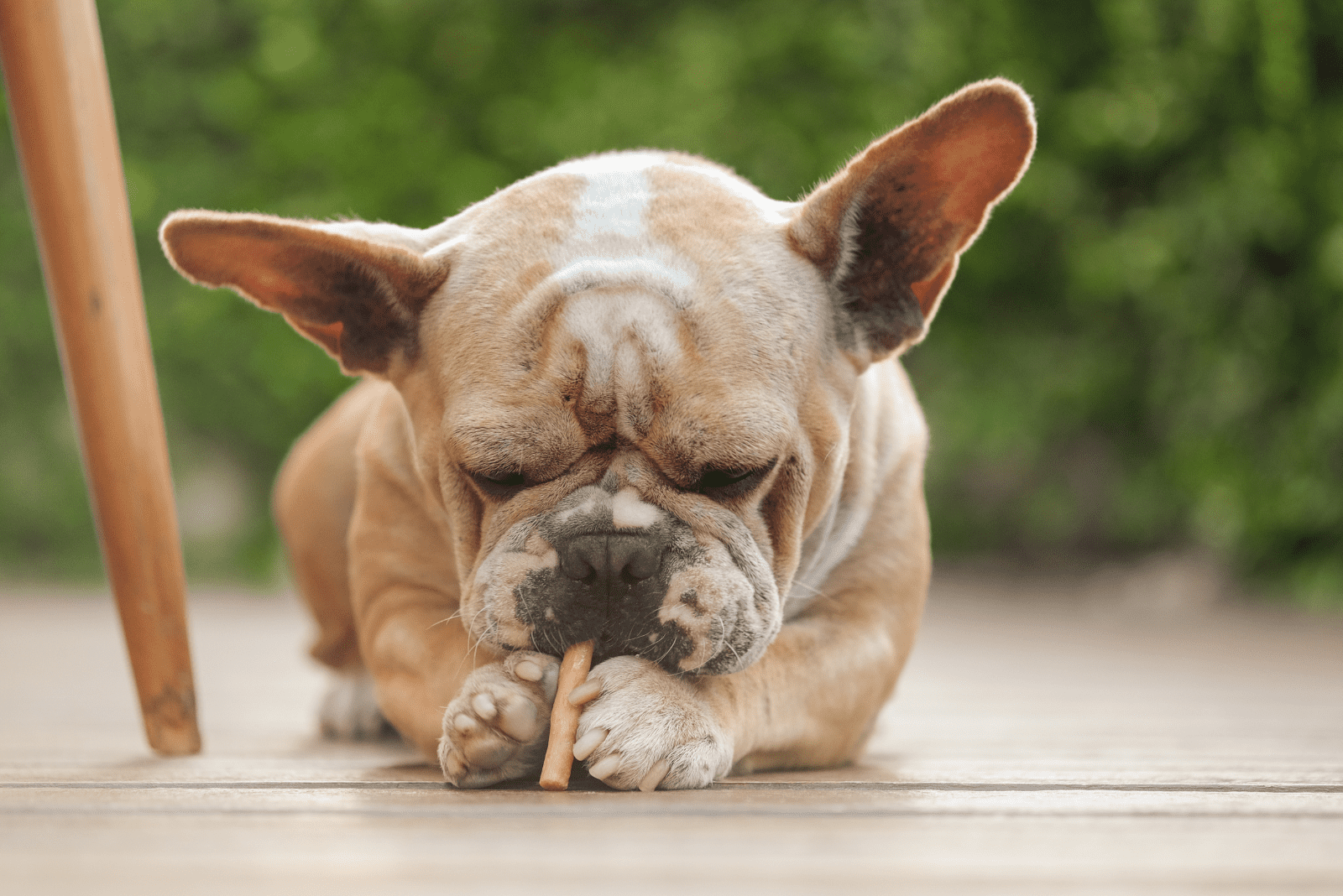
Feeding a Frenchie isn’t a challenging task, but it does require you to follow certain guidelines if you want your pup to grow into a healthy adult canine.
There are certain factors that should be taken into consideration when it comes to French Bulldog feeding habits and rituals, including the pup’s size and age, the gender of the pup, and whether the Frenchie mom is in the breastfeeding period or not.
An eight-hour window allows for three meals each day for French Bulldogs that are expecting or nursing. Adult canines require regular mealtimes as well, which should be limited to three times in one day at the most, but with less amount of food and nutrients than for a nursing Frenchie (every eight hours would be the perfect feeding time frame).
However, when it comes to Frenchie puppies, their digestion is much faster, which is why they need more frequent feedings.
The optimal feeding time for puppies would be up to four times a day, within the range of every six to eight hours (depending on whether you’re sticking to the three- or four-meal plan).
If you’re wondering when the right time to switch from puppy to adult feeding time is, the answer would be somewhere around six months of age.
When the French Bulldog puppy turns six months, the number of meals per day can be cut down to two, and the frequency of feeding can be decreased without any fear of underfeeding the pup.
If you don’t cut down on the number of feedings, you should take care of the amount of food your young adult pup is receiving.
French Bulldog Feeding Routines and Timings
The timing of your French Bulldog’s meals is just as important as the amount and frequency of your dog’s meals. Your Frenchie puppy needs a regular feeding schedule as it grows up.
At the very least, two to three meals should be weighed out each day. There’s no need to worry about your dog gaining weight if you give them the right quantity of food during each meal.
If your Frenchie is scheduled for having meals three times a day, the meals should be divided like this:
• First one at seven o’clock in the morning
• Second meal at noon
• Third meal at five in the afternoon
The last meal time is crucial since it gives the puppy enough time to eat and go to the bathroom before sleep.
This is critical if you want a good night’s rest for both of you.
If you decide to follow a two-meal plan per day, you might begin when your pup turns at least four months of age.
This is subject to change based on the general health of your French Bulldog. A three-meal diet for your French Bulldog must be strictly adhered to if recommended by your vet.
Senior Frenchie Feeding Routine
When fed three meals a day, senior dogs cannot maintain the same feeding pattern as younger dogs.
Because they are less active as they age, senior dogs are more likely to gain weight.
It’s critical to regularly check their weight to make sure they’re staying within a healthy range.
Therefore, you should make sure that their diet is rich in fibers, but doesn’t contain a lot of calories.
Also, the senior Frenchie’s diet requires an adequate mix of protein and healthy fats that can be found in fish oils and other natural sources.
Treats shouldn’t make any more than five to ten percent of the senior’s diet plan at all, which is why it’s better to go for a fruit or a vegetable than commercial dog treats.
When it comes to giving your dog treats, your veterinarian will be able to tell you how much to give your pet. It will depend on the weight and amount of activity of the canine.
However, if treats are a regular part of training, and your canine doesn’t want to trade them for fruits and veggies, you can try to use a licking mat with their favorite taste, or go with tiny bits instead of the whole treat.
You may also use a portion of your dog’s regular kibble as a training incentive if needed.
Best Dog Foods For Frenchies
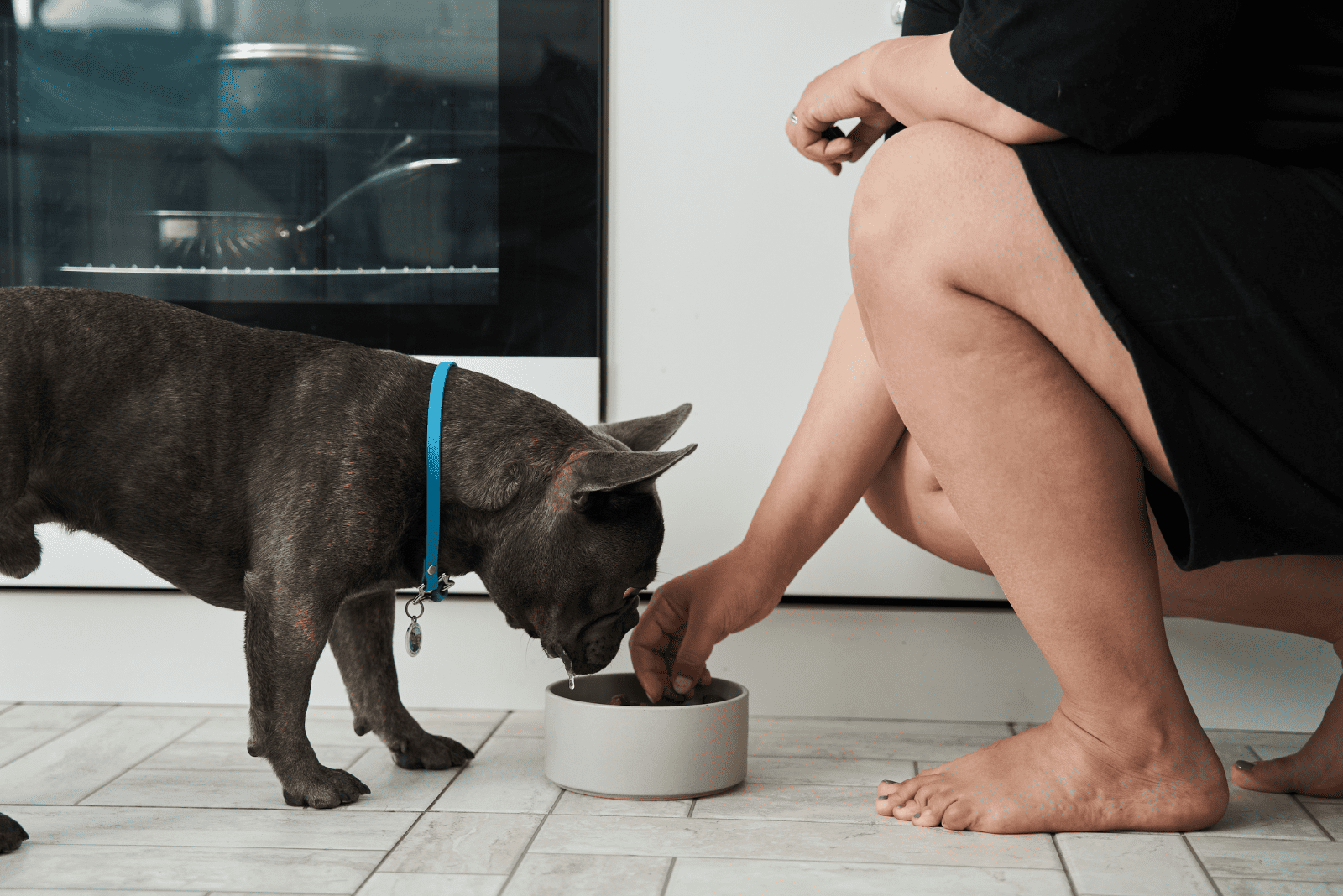
Pet food recommendations are essential to the feeding guides for Frenchie owners, and this one is no exception.
It doesn’t matter if you’re raising a puppy or looking after an elderly dog; it is always essential to know which food is good for a Frenchie and which food should be avoided.
A puppy’s nutrition is equally as important as an older Frenchie’s diet, and it should be followed just as strictly if you want to have a healthy pup with decreased risks of serious health issues.
There are a wide variety of foods for French Bulldogs to choose from.
The ideal type of food for a Frenchie is individual. Food allergies or picky eating habits might be to blame for your French Bulldog’s inability to eat certain foods. This is why it’s crucial to keep an eye on your Frenchie’s reaction to various dog meals.
If you feed your French Bulldogs the highest quality commercially-prepared or homemade dog food available, you will be able to offer them a menu that is nutritionally complete and balanced.
Types Of Food
Here are some of the most common pet foods that are used in a dog’s diet. These types of food are generally used for many dog breeds, including Frenchies, German Shepherds, Labs, and other canine types.
RELATED: 15 Best Dog Foods For German Shepherds: Top Yummy Choices Your GSD Will Adore!
As you’ll see in the list below, there are several ways to feed your Frenchie pup. If you’re not sure which type of food would be the best choice for your pup, you can always consult with your vet.
Dry Food
Kibble is another name for dry dog food, which can be bought in almost every store in the United States.
There are different brands that include different types and amounts of nutrients in their products, so make sure that you read the nutrition label before you buy it.
This may be a much better option for French Bulldogs that have a tummy that is very sensitive.
In order to help in their growth and in the development of their muscles, French Bulldog puppies need to be fed a high-quality dry diet that is rich in animal protein.
On the other hand, according to the Association of American Feed Control Officials (AAFCO), an adult French bulldog has to consume a diet that is rich in calories, so try to make the balance between the two that will not lead to obesity.
Homemade Food
It is best for French Bulldogs to consume a home-cooked meal that is high in protein and includes foods like chicken. It differs from regular kibble in that it does not have any chemicals or additives.
Preservatives and additives aren’t necessarily a bad thing, but they should be avoided if there’s any way to do so.
The home-cooked diet promotes good digestion and may assist in the prevention of a number of issues that are linked to an unhealthy diet, including obesity as the number one enemy, diabetes, dry patches on skin and fur, pancreatitis, and weakened immunity.
There are many great recipes online for homemade canine food, but be careful to follow the calorie intake and the number of nutrients that are put inside the dish.
BARF Diet
The BARF Diet, also known as the Biologically Approved Raw Food Diet, is a form of a raw food diet that focuses largely on the consumption of raw meat and bones, in addition to a wide variety of fruits and vegetables.
The proportions of food that should be consumed on a BARF diet are strictly followed by the percentages of a certain food that the diet should contain.
In order to follow the BARF Diet, your pup will need to eat:
• 70 percent high protein, such as chicken without bones
• 10 percent raw chewable animal bone
• 5 percent liver
• 5 percent of other glandular organs
• 7 percent vegetables
• 2 percent walnuts or nuts
• 1 percent fruits
Wet Food
Food that is regarded to be very squishy and wet (logically) is often stored in a can, and it contains a high percentage of water as its essential component.
This type of food might be considered as an addition to dry food or the main meal itself, depending on the way you’re feeding your Frenchie.
Dry food is usually more practical than wet food, as the latter has a shorter shelf life, making it the option with the least amount of utility.
However, it’s much softer and easily digestible, so if you’re looking for food that will keep your Frenchie’s teeth intact, especially when they’re young, then wet dog food might be just what you need.
What Foods Are Recommended For Frenchies?
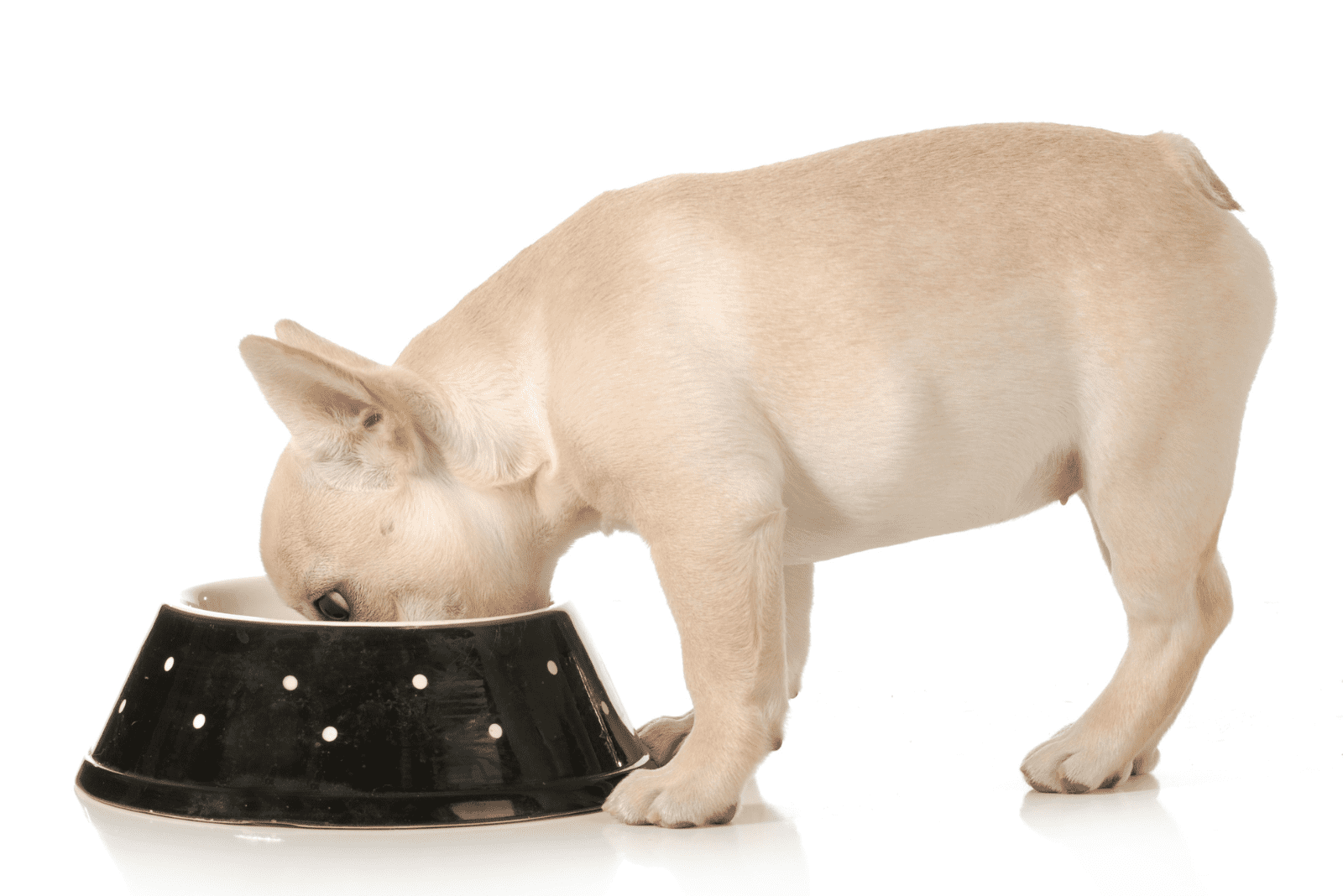
The best food for Frenchies includes nutritious ingredients that don’t contain any toxins or chemicals, which might cause your pet stomach troubles or other health issues.
Chicken is one of the most common animal proteins that is found in dog food, but did you know how beneficial sweet potatoes can be for Frenchies?
It can be a delicious treat that your pet will love, but he’ll also benefit greatly from its good characteristics.
However, even though they’re healthy, sweet potatoes should be taken with caution as well. Even healthy foods can cause trouble if they’re taken in excessive amounts.
Carrots, bell peppers, whole peas, turkey meat, salmon, tuna, beef, pumpkin, yogurt, and other foods are great choices for homemade meals, while some of them can be used for raw feeding as well.
Which Health Issues Are Triggered By Food?
Conditions such as luxating patella, elbow, and hip dysplasia are nothing new in the world of senior small-breed doggies, including French Bulldogs.
Generally, joints and bones seem to weaken over the years, but they might deteriorate seriously if you add an excessive amount of weight to their age.
If you want your Frenchie to be a healthy dog, all you need to do is offer meals that contain an abundance of supplements that contribute to the health of joints as well as general well-being.
There are two substances that add to the quality of a Frenchie’s diet, especially during their older age, and they are chondroitin and glucosamine.
These two nutrients will provide your pup with a stronger immune system and a sturdier body frame, similar to the one they had at an earlier age.
Foods You Shouldn’t Give Your French Bulldog
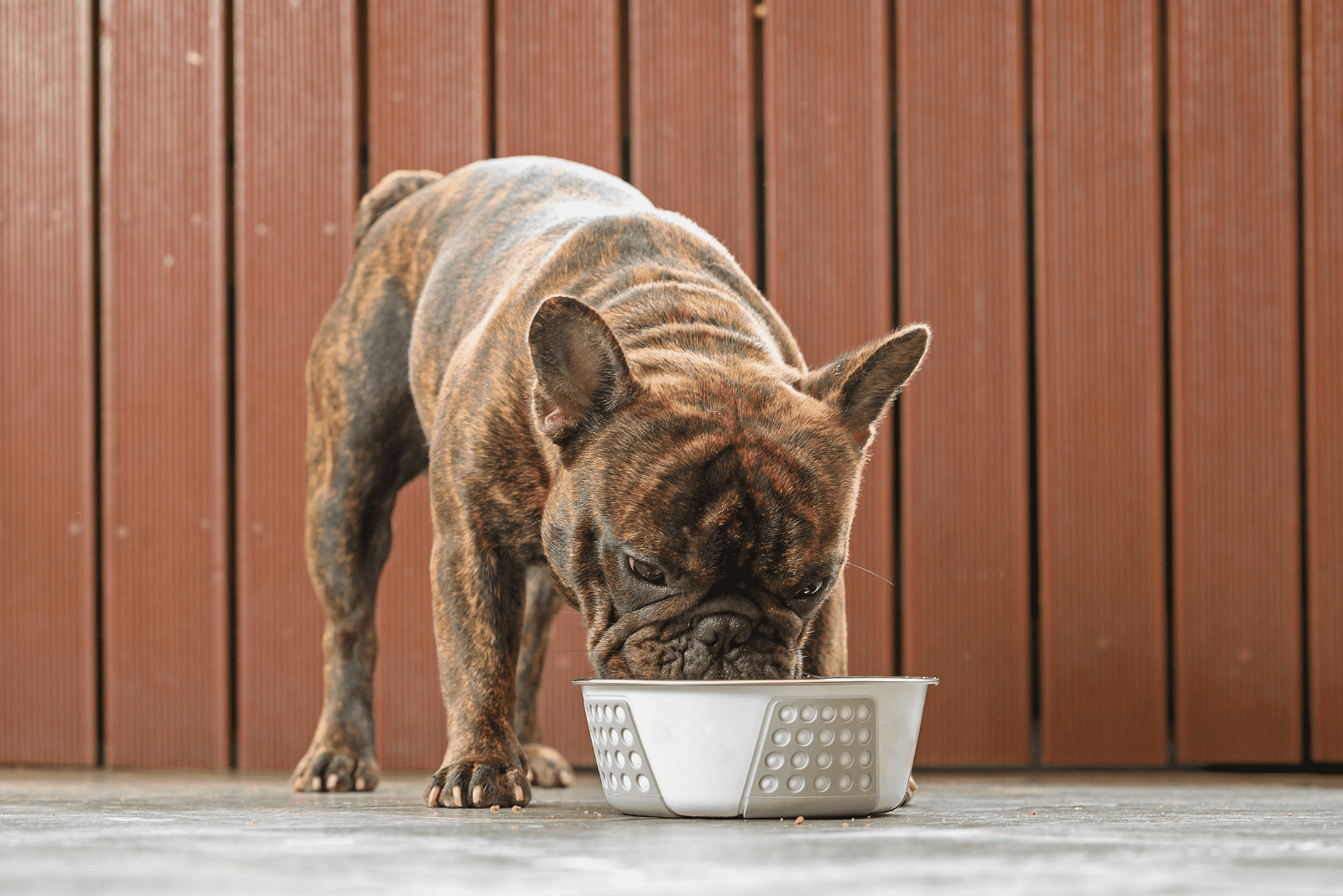
Unfortunately, Frenchies have been known as a canine breed with a sensitive belly, which is why their diet has to be under full control, and without unsupervised excursions.
Any owner of a Frenchie can attest to the fact that the breed is significantly more likely to have episodes of vomiting than any other type of canine.
You should be aware of what parts of human diets can be harmful to French Bulldogs, even if this can never be completely avoided.
There are certain food items that won’t just leave temporary damage to the Frenchie’s health, but might also lead to life-threatening conditions.
It doesn’t necessarily mean that what’s not toxic for you is non-toxic for your pet as well. That is why you should keep all your food at a safe distance from your pup in order to avoid poisoning.
This part of the article lists a few of the meals that are considered most harmful to French pups.
Keep in mind that the best way to know which foods aren’t good for your pet is to consult your vet. Only a professional will be able to tell you detailed information on the food that isn’t suitable for Frenchies, as well as the consequences that might appear if that food is consumed.
Types Of Food That Are Not Recommended
Chocolate is the first and most common of these ingredients. When ingested in excessive quantities, it is toxic due to the presence of a substance known as theobromine, which is known to cause a wide range of health issues.
The intoxication can result in episodes of seizures, arrhythmia, or even complete heart stop.
Another food that shouldn’t be on your Frenchie’s menu is red onions and garlic. Whether your pet is a puppy or a senior, their body simply can’t take the smallest dose of these ingredients.
Even a small amount of these veggies might cause your pet to suffer from anemia and a deficiency in red blood cells.
Symptoms of intoxication include lethargy, exhaustion, as well as nausea, staring in empty space, breathing difficulty, and an elevated heart rate.
Keep in mind, however, that you might not detect any sign of poisoning right away because the toxic effects might not appear for a few days after the exposure to the toxin.
Fruits are generally considered a good choice for treats, especially when it comes to senior canines. However, not all fruits are suitable for Frenchies.
Grapes are one of the fruits that are the most dangerous for your French Bulldog to consume. Grapes can cause gastrointestinal distress in dogs, including abdominal bloat and diarrhea.
Your puppy has to be transported straight to a veterinarian as soon as possible in case of grape consumption. The vet will perform the most effective treatment options for severe patients, such as gastric lavage.
Candies, sugar substitutes, barbecued bones, avocados, raisins, almonds, cherry, peach, plum, coconut, mustard seeds, alcoholic beverages, coffee, blue cheese, and tomatoes are also considered to be hazardous for French Bulldogs because of the negative effects that they might have on the dog’s health.
How To Change Your Frenchie’s Diet
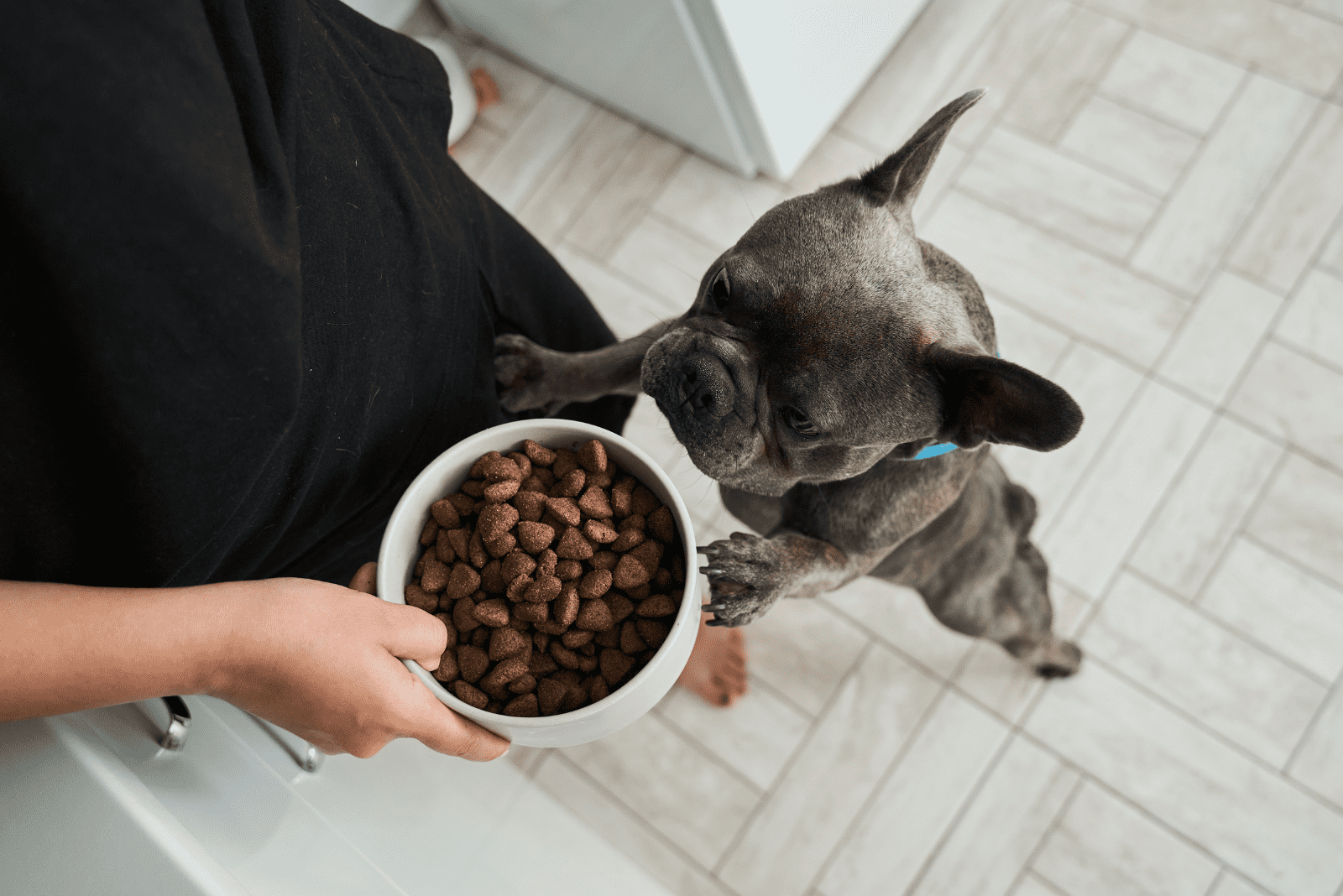
If you get your pet used to a certain routine regarding their eating habits, it can be quite difficult to make a transition to a completely different diet.
It’s possible that your vet has suggested a special type of diet for your pet, or maybe you’ve decided to try out a different kind of food.
Whatever your reasons may be for making the change, you may find that it is more difficult than you had anticipated.
Slow Start
You need to gradually introduce your dog to the new food that you have decided to give it in order to prevent stomach issues.
Altering your furry companion’s diet all of a sudden might give rise to gastrointestinal issues.
During the switch, you should make the transition as slowly as possible by adding new types of food into the existing diet and decreasing the amount of food that should be avoided gradually until it’s completely gone off the menu.
This needs to be done in order to give your dog’s digestive system time to adjust to the new diet. These alterations should preferably be made over the course of one week.
The Transition
Within the allotted time frame for the shift, you will need to progressively include more of the types of food into your pet’s existing diet by blending them into their daily meals.
The American Kennel Club (AKC) suggests beginning with around 25 percent of the new ingredients, and gradually increasing it to 100 percent until the dog’s previous diet is entirely replaced.
This process should be repeated until the Frenchie is completely fed with different dishes.
However, you should take into consideration that some canines might take more or less time depending on whether they’re taking any medicines or if they have some type of gastrointestinal issue.
If your pet suffers from any condition that might be influenced by a change in diet, you should contact your vet and check whether it’s safe to move on with the transition.
How To Feed an Overweight Frenchie
There’s a thin line between serving solid amounts of food and overfeeding your French Bulldog, so it’s no surprise that many Frenchies end up being overweight, even if they have an owner who takes great care of them.
The ideal body weight of a male adult dog would be between 20 and 29 lbs, while healthy female Frenchies usually weigh up to 28 pounds.
Lack of muscle tone and trouble breathing after a short activity are two of the most typical symptoms indicating that your French Bully is overweight.
Scales are also a great way to check whether your pet is obese. If their weight exceeds the ideal body weight parameters, it’s safe to say that your pup has excessive weight.
There are other ways to confirm that your pup is obese, but what I’d like to focus on now is the way to feed a Frenchie that prevents being overweight.
Fighting Obesity With Routines
As I mentioned above, routines are crucial parts of a dog’s diet, as well as the correct amount of food given at those times.
Although there are plenty of online recommendations, they can be taken as general guidelines for canines of impeccable health.
However, if your pup is over or underweight, a dog expert (vet) should confirm the amount of food that should be contained in each meal, along with the number of meals in a 24-hour time frame.
If your pet is slightly overweight and you think you can help it achieve healthy body weight, you can do so by reducing the daily food intake by half a cup, and cut treats, at least, in half.
It’s better to give your pet a single-ingredient treat that won’t contain a lot of calories or added sugar.
Sweet potatoes, apples, carrots, and blueberries might just be the right choices.
Make sure that every member of the household is familiar with these protocols in order to maximize the efficiency of the strategy.
You should determine an ideal weight for your French Bulldog, measure it on a frequent basis, and keep track of the number of calories it consumes.
Wrapping Up
I hope that after you went through this French Bulldog feeding chart, you got the idea of what your Frenchies’ meals should look like, and how often they should be fed.
Chocolate, piebald, sable, cream, or black and white… all French Bulldogs should be fed with high-quality food in correct amounts.
The type of food depends on your pup’s needs and your personal preferences. Some might say Royal Canin is the best, while others might claim the same for numerous other products.
If you’re not sure which puppy or adult dog food is the best for your French Bully, you can consult with the vet and try out several types until you find the perfect match.
Most of the dry and wet food can be found on shopping sites such as Amazon, Chewy, or Walmart, so you don’t have to leave your home!
READ NEXT:
Are French Bulldogs Hypoallergenic Or Not?
What Is A Long-Haired French Bulldog, And How Do You Take Care Of One?
French Bulldog Potty Training: How To Potty Train Like A Pro
How Much Are French Bulldogs – Why Are These Cuties So Expensive?!
